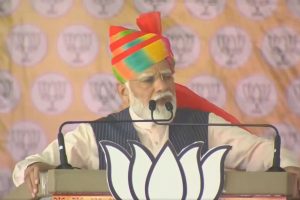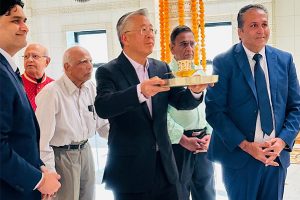The world has progressed through heresy, not piety. Piety, in most cases, involves no more than blind faith. Blind faith breeds intolerance and inhumanity. Literally, blind faith is faith that makes people blind. The profiteers of religion and politics find it irresistible to take advantage of it.
Consider this significant anomaly of our times. Modernity is characterized by its contumacy towards authority. All embodiments and foci of authority ~ especially religion and tradition ~ were questioned and marginalized in the western context. But blind faith in authority remains endemic among us.
The duty of the individual to seek and find his own spiritual path, and not follow the beaten tracks of time-worn religiosity, was deemed basic to spirituality universally. Lord Buddha insisted that his path was not mandatory for anyone.
The individual has to find the path for himself. Jesus Christ, likewise, said: “Seek, and you shall find”. To Him, seeking and finding the spiritual path, and not following the ways of the religious establishment by herd-instinct, was the dynamic core of a person’s spiritual destiny. Maharshi Dayanand urged his followers to “doubt, debate and, if need be, to dissent”.
Swami Vivekananda went to the extent of maintaining that, in the event of the scriptural texts running counter to the basics of humanity, they ought to be critiqued and, if need be, discounted. Responsible skepticism had been a distinct and sacred strand in Indian spirituality.
That changed with the advent of gurudom. The foremost casualty of gurudom was the duty to think for oneself. The guru knew all. He was the authoritative, and, ultimate source of wisdom. The shishya had only to lap up whatever fell from the guru’s mouth and not think for himself. Through gurudom blind faith suppressed the spirit of seeking in individuals. Modern education in India was erected on the hidden foundations of gurudom.
The one thing that we have never allowed to grow in academia is the culture of free thinking. In most schools, children are punished for applying their minds and deviating from prescribed answers. It is by a benign stroke of destiny that a rare student escapes its intellectually deadening effect and retains sparks of originality and innovation.
Ask: why is it that Indian students who go to universities overseas excel? Why do some of them prove geniuses? And why others, perhaps equally talented, embedded in our intellectually dull and dogmatic environment, stagnate and shrivel over time?
The collateral victim of our conditioning in blind faith in authority is democracy.
If ever Indian democracy ~ still in its infancy ~ crashes into fascism, we would have to thank our readiness to surrender our reason and responsibility to some else’s keeping for it.
So long as the present tendency of reposing blind faith in leaders ~ especially those who flaunt political authority decked with religious frills ~ continues, our exercises in franchise cannot be ‘free and fair’. Truth is fundamental to making free choices, as it is to freedom itself. Choices made misled by someone are neither free nor fair.
Enemies of human freedom use falsehood to decoy the people into acting against their own best judgments. Truth, as Gandhiji insisted, is the liberator. He confronted the might of the Raj with the power of truth and shook it to its very foundations.
If a people are hooked on untruth ~ through a gamut of ploys like partisan media fanfare, false propaganda, mendacious rhetoric, willful misrepresentation of facts, the paralysis of objective thinking with the nerve-gas of communal polarization, etc ~ how can anyone be said to exercise his or her choice?
Individuals can exercise their will only if they know the truth of the situation and have an environment conducive to dispassionate, objective thinking. Any infusion of prejudice into it makes objective thinking and ‘free’ choice of people’s representatives impossible.
Consider a comparable situation to see this issue in perspective. Performance-enhancing drugs are banned in athletics, as they give an unfair advantage to those who use them. Benefiting from the use of such substances upsets ‘the level playing field’ in competition.
Unleashing false and malicious propaganda in campaigns, communally vitiating the ambience of polls, mounting personal attacks against political rivals on charges they have no chance to defend themselves against ~ in effect, condemning them without trials ~ are all worse than the use of performance-enhancing drugs in athletics, where such abuses are tested and unfair results annulled. In elections, the results stand.
What makes the problem alarmingly dangerous is the blind faith we repose in leaders. Even highly educated people are no exception to this. We tend to glorify, even deify, those who enjoy state authority primed with the gift of the gab. We are mesmerized by mega mobilization and hypnotized by hypes.
We have an irrational reverence for offices. A Prime Minister, never mind who, commands our trust and veneration by virtue of holding that exalted office.
For that reason, its incumbents are expected to maintain a high order of rectitude, truthfulness, magnanimity and dignity. The mystique of the office disarms the people from distrusting what they are told and makes them vulnerable to manipulation. This is less of a problem in western societies where authorities are not venerated.
From the perspective of hypnotizing the masses with authority, nothing is more potent than a religio-political hybrid. A Prime Minister, who is cast in the mould of a demi-god ~ as in the hysterical chant NaMo, NaMo, NaMo ~ has the potential to induce in the masses a willing suspension of disbelief. He can make his audiences peck from his hands.
We eulogize this as the “Modi magic”. It rarely occurs to us to wonder if magic conduces to the health of a democracy. The magical mindset mocks the very essence of democracy. And that should be a cause for worry.
On our part, we could serve our democracy better by cultivating the spirit of heresy, of thinking for ourselves, in lieu of blind faith in fake saviours. We can do no better, even for religion.
The writers are an inter-religious team committed to social justice and God-centred harmony of all faiths. They can be reached at agnivesh70@gmail.com and vthampu@gmail.com











